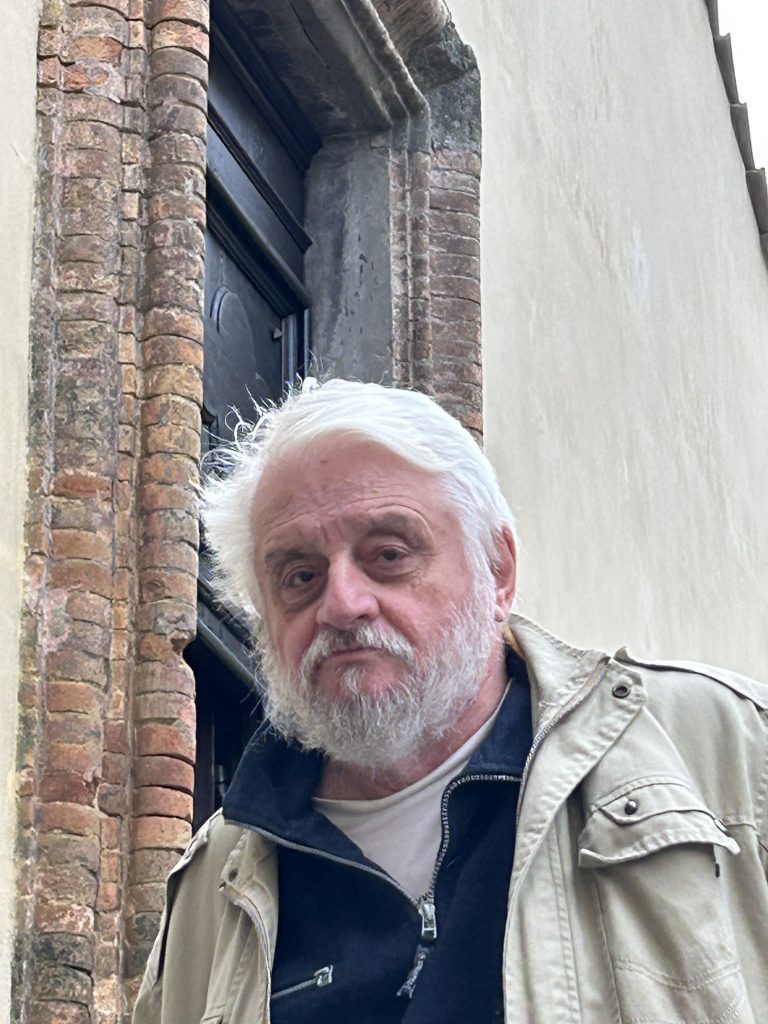Ukrainian poetry, art and Jewish heritage
The conversation is a collaboration between the Uppsala International Literature Festival, the Ukrainian Institute, Jewish salon, Korpens publishing house and Uppsala art museum.
Uppsala konstmuseum
Saturday March 23, 14.00
Language: Russian
Fri entrance! Book your ticket via Tickster, click <here>
Boris Cheronskij used to be one of the most important Russian-language poets in Ukraine, but after Russia’s aggression and invasions in 2014 and 2022, he, like so many in Ukraine, has left Russian. Now Cheronsky writes his poetry in Ukrainian.
Cheronskij is the author of more than 20 books of poetry, prose and essays, several of which have received prestigious prizes in the USA, Germany, Austria, Russia and in his native Ukraine. Now a selection of Cheronsky’s poetry is presented for the first time in Swedish, selected and translated by Dmitri Plax, writer, director and translator. The collection of poems has been named Shock Wave: poems in selection and, in addition to the conversation, we will hear Boris Cheronskij himself read his poetry.
Khersonskij began writing poetry already at the end of the 60s and during the 70s and 80s became one of the leading forces in the samizdat movement, underground networks for the dissemination of banned writings in the Soviet Union. During this period, most of his own poems could be published abroad. Since then, his works have been published both in Russia and many other countries. When Russian PEN offered Cheronsky membership in 2014, Moscow ”patriots” are said to have reacted with outrage, calling him a ”Jewish fascist” because of his support for the Maidan protests. Cheronsky’s answer was laconic: ”I think, speak and write Russian, but I am neither a serf to the Russian language nor a slave to it. And what shall I say about the Jewish fascist?”
The Jewish heritage and Ukraine’s struggle for freedom and independence constantly recur in Cheronsky’s poetry and writings. In 2006, one of his most important lyrical works, Semeiny arhiv (Family Archive), was published. The book tells the story of a Russian-Jewish family against the background of the tragedies that befell them during the 20th century in poetic form. He writes about the shtetls, Jewish villages, smaller towns and neighborhoods where his ancestors lived, about his own alienation from that heritage, about the stagnant presence of Soviet memorials in Ukraine, and about Orthodox Christianity, to which he converted.
In the poetry collection Missa in tempore belli/Messa vo vremena vojny (Mass in times of war), published in 2014, Khersonskij processes his impressions of the Maidan revolution. The following year saw Otkrytyj dnevnyk, a ”public diary” about the Ukraine crisis, with a particular focus on Cheronsky’s hometown of Odessa.
Cheronsky’s written output is not only fiction, but also contains a series of scientific articles and research reports he produced as a professional psychologist and psychiatrist. As such, he is well known far beyond Ukraine’s borders, and his choice of profession is also evident in Cheronsky’s deep interest in human nature in his literary works.
Samtalsledare är Anna Grinzweig Jacobsson, författare, fysiker och ordförande i Judiska Salongen i Göteborg. Hon debuterade som författare med ”Flykten till Marstrand”, berättelsen om hur de polsk-judiska flyktingarna kom till Sverige 1969. Hennes andra bok, ”Bröllopspogromen – En ukrainsk-judisk familjeberättelse” handlar om hennes egen släkthistoria under sovjetiskt 1900-tal.
The conversation leader is Anna Grinzweig Jacobsson, author, physicist and chairman of the Jewish Salon (Judiska Salongen) in Gothenburg. She debuted as a writer with Flykten till Marstrand, the story of how the Polish-Jewish refugees came to Sweden in 1969. Her second book, Bröllops pogromen – A Ukrainian-Jewish family story is about her own family history during the Soviet 20th century.
The conversation takes place against the backdrop of the exhibition “Border Memory,” the Ukrainian artist Zhanna Kadyrova’s first solo exhibition in Sweden, in which through large-scale installations, video and photography she depicts the reality of the Ukrainian people since Russia’s full-scale invasion in 2022. The conversation is a collaboration between the Uppsala International Literature Festival, the Ukrainian Institute, Jewish salon, Korpens publishing house and Uppsala art museum.

